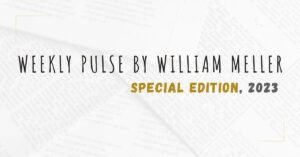The Weekly Pulse is my content curation and my highlights from readings, books, podcasts, insights, and everything I discovered during the week.
So, let’s go with some discoveries from the week!
#1 – The Psychology Behind Meeting Overload
#2 – Strategy for a Digital World
#3 – This is My Brain on Coffee
#4 – Toxic Culture Is Driving the Great Resignation
#5 – Using the Balanced Scorecard as a Strategic Management System
The Psychology Behind Meeting Overload
Source: Harvard Business Review
Author: Ashley Whillans, Dave Feldman, and Damian Wisniewski
Summary: Bad meetings are the bane of the corporate world — and yet despite what appears to be an overwhelming consensus that they’re often unnecessary and unproductive, many workplaces continue to struggle to avoid them. The authors discuss the psychological pitfalls that lead us to schedule and attend too many meetings, and share strategies to help overcome those challenges.
3 Highlights:
“… To avoid meeting amnesia, schedule a short five-minute team debrief after key internal and external calls. These debrief are especially important in a fully virtual environment…“
“… Scheduling and attending meetings can make us feel like we’ve accomplished something, and so we’re often loath to decline or cancel them, even if they are objectively not as important as our other work...”
“… We all fall prey to the Egocentric Bias from time to time — that is, the tendency to focus more on our own needs, desires, and perspectives. When it comes to meetings, this bias yields a phenomenon that we call “selfish urgency.” That is, leaders will schedule meetings whenever convenient for them, without necessarily considering their teams’ needs or schedules…”
Access the full Weekly Pulse here >>
Strategy for a Digital World
Source: McKinsey
Author: Simon Blackburn, Jeff Galvin, Laura LaBerge, and Evan Williams
Summary: By accelerating digital adoption, the COVID-19 pandemic has widened the gap between the top and bottom companies on the power curve of economic profit, amplifying winner-takes-most dynamics and further separating digital leaders from also-rans. Competitive differentiation, now more than ever, emerges from superior digital capabilities and agile delivery.
3 Highlights:
“… Dynamic resource allocation shifts money, talent, and management attention to where they will deliver the most value to your company…“
“… Legacy companies may find that remote working and the mass migration to digital channels has helped them discover unexpected savings from cheaper customer interactions and—in some cases—the ability to let go of real estate as they shift toward hybrid working…”
“… Using enterprise agility to meet rapidly changing customer needs can result, unsurprisingly, in a better customer journey…”
Access the full Weekly Pulse here >>
This is My Brain on Coffee
Source: Fast Company
Author: Daniel Pink
Summary: Call Daniel Pink Mr. Coffee. He doesn’t just enjoy the stuff. He needs the stuff. But why? Simply because of the happy dance that the brain cells perform whenever they meet caffeine molecules? Or is the need lodged somewhere deep in the subconscious?
3 Highlights:
“… The overall story is about preparation the night before because of the expectation of morning immobility, then the release of power and the start of the day, then the fact that this goes on every morning…“
“… Market your product to me using images of movement and achievement…”
“… INow that we’ve anthropomorphized this cup of coffee, let’s say that it’s thinking…”
Access the full Weekly Pulse here >>
Toxic Culture Is Driving the Great Resignation
Source: MIT Sloan Management Review
Author: Donald Sull, Charles Sull, and Ben Zweig
Summary: While resignation rates are high on average, they are not uniform across companies. The Great Resignation is affecting blue-collar and white-collar sectors with equal force. In general, corporate culture is a much more reliable predictor of industry-adjusted attrition than how employees assess their compensation.
3 Highlights:
“… A toxic corporate culture is the single best predictor of which companies suffered from high attrition in the first six months of the Great Resignation...“
“… This is not to argue that compensation and burnout don’t influence attrition — of course, they do. The important point is that other aspects of culture appear to matter even more…”
“… Leaders who are serious about winning the war for talent during the Great Resignation and beyond, however, must do more. They should understand and address the elements of their culture that are causing employees to disengage and leave…”
Access the full Weekly Pulse here >>
Using the Balanced Scorecard as a Strategic Management System
Source: Harvard Business Review (Magazine Article)
Author: Robert S. Kaplan and David P. Norton
Summary: In 1992, Robert S. Kaplan and David P. Norton’s concept of the balanced scorecard revolutionized conventional thinking about performance metrics. By going beyond traditional measures of financial performance, the concept has given a generation of managers a better understanding of how their companies are really doing.
3 Highlights:
“… By relying on measurement, the scorecard forces managers to come to an agreement on the metrics they will use to operationalize their lofty visions…“
“… The personal scorecard helps to communicate corporate and unit objectives to the people and teams performing the work…”
“… The balanced scorecard, with its specification of the causal relationships between performance drivers and objectives, allows corporate and business unit executives to use their periodic review sessions to evaluate the validity of the unit’s strategy and the quality of its execution.…”
Access the full Weekly Pulse here >>
Do you want to get new content in your Email?
I am incredibly grateful that you have taken the time to read this Weekly Pulse.
The Weekly Pulse is an important section of this website, aiming to share good stuff with you every week!
Do you want to explore more? Check more Weekly Pulse content here.
Check my main categories of content below:
- Agile
- Blog
- Book Notes
- Career
- Leadership
- Management
- Managing Yourself
- Productivity
- Project Management
- Technology
- Weekly Pulse
Navigate between the many topics covered in this website:
Agile Art Artificial Intelligence Blockchain Books Business Business Tales Career Coaching Communication Creativity Culture Cybersecurity Design DevOps Economy Emotional Intelligence Feedback Flow Focus Gaming Goals GPT Habits Health History Innovation Kanban Leadership Lean Life Managament Management Mentorship Metaverse Metrics Mindset Minimalism Motivation Negotiation Networking Neuroscience NFT Ownership Parenting Planning PMBOK PMI Politics Productivity Products Project Management Projects Pulse Readings Routines Scrum Self-Improvement Self-Management Sleep Startups Strategy Team Building Technology Time Management Volunteering Work
Do you want to check previous Weekly Pulse posts? Check the last couple of weeks:
- Weekly Pulse by William Meller | Special Edition, 2023
- Weekly Pulse by William Meller | Week 51, 2023
- Weekly Pulse by William Meller | Week 50, 2023
- Weekly Pulse by William Meller | Week 49, 2023
- Weekly Pulse by William Meller | Week 48, 2023
Support my work by sharing my content with your network using the sharing buttons below.
Want to show your support tangibly? A virtual coffee is a small but nice way to show your appreciation and give me the extra energy to keep crafting valuable content! Pay me a coffee:





